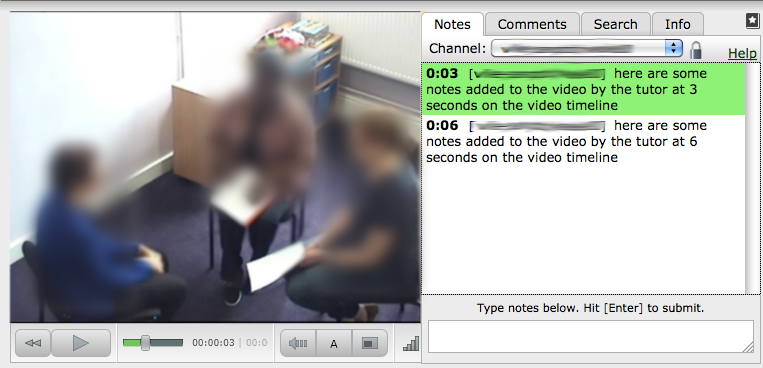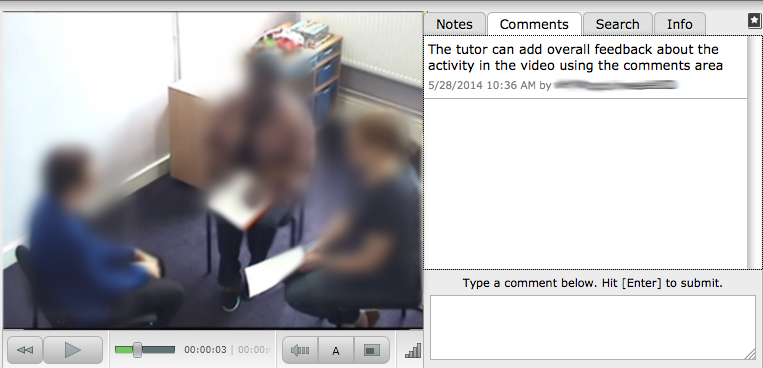 |
Using video recordings of nursing student role-play sessions for formative reflective learning |
|
Project Leads
Chris Knifton, Richard Postance, Helen Rooney, Dr. Rob Weale (CELT) DMU
School of Nursing and Midwifery Faculty of Health and Life Sciences |
|||
|
Objectives and Approach
|
| The role-play sessions involved placing students into a simulated realistic situation and recording (video and audio) their behaviours. The videos were then uploaded to the DMU VLE (Blackboard) where students could view the recording and in dialogue with their tutors, reflect on their behaviours in the role-play situation. Through this reflective and dialogic process the students identify areas of good practice and areas where they may need to adapt or change their behaviours.
In the sessions run by Chris and Richard, Level 5 – learning disability nursing students were placed into a situation where they were seeking consent for a medication that had been prescribed by a consultant, from a patient who has a learning disability. During the consultation the patient suffers a tonic-clonic seizure to which the student is expected to respond in a medically appropriate manner. Richard assumed the role of the patient – which he performed in a very convincing manner. Where there is some element of ’acting’ involved in the role-play it is important that the ‘actors’ are reasonably competent in order to adequately lend the session an air of realism. In the sessions run by Helen, Level 5 – mental health nursing students were placed into a situation where they were assessing a person who has been experiencing suicidal ideation and needed to use interview skills taught prior to the clinical skills session to determine the content, intensity, frequency of these thoughts, in order to determine the person’s intent to commit suicide. Given the nature of the material being recorded, it was essential that individual consent be obtained from all participants who would be recorded in the session. To this end a consent form was created for this specific activity. The principal reasons for this consent were to give assurances to the students about where the video recording would be shown, what restrictions there were in terms of who was able to view the video, for what purposes the videos could be used, and a clear indication as to how long the videos would be kept in a ‘viewable’ repository. Controlling who views the videos In this particular case the students who took part in the role-play sessions would only be permitted to view the recordings of themselves (and other students who were participating in their particular recorded group role-play session) and not the recordings of any of the other students. To facilitate this, each individual recording was stored in a folder on the DMU Replay system that was only visible to certain students. For more information about creating private folders in DMU Replay visit: Adding notes to the video recordings Helen Rooney utilised the note making and comment functionality in the Panopto system to give targeted feedback to students on their behaviours in the role-play activity. Helen adds notes to particular points in the video timeline giving feedback as to her observations. When viewing the videos students can click on these individual notes, which automatically takes them to the point in the video timeline to which the note refers.
Helen also used the comment function to write general, overall comments about the student’s activity.
It should be noted that using the note and comment function to annotate each individual video, albeit easy to use, carries with it a time overhead, similar to that when giving the same type of written feedback in a paper-based format. |
|
Outcomes
|
| Student feedback
There was an understandable initial nervousness and unease from students about having their ‘behaviours’ recorded in this way. However, all of the students who took part in the role-play activities overcame this, and on reflection were positive about the effectiveness of the approach in terms of their learning – as evidenced in these selected anecdotal responses, collected after the students had had the opportunity to view their video and reflect on their behaviour: “After reviewing the recording I have felt competent in working on my own with clients and to a professional standard. ” “Initially when I was told about the exercise I was a little apprehensive, but once the trial (role play videoing) was underway I wasn’t aware of anyone else in the room and I just focused on the role I had been given. I think it is a very valuable exercise and it helps to prepare you for the ‘real’ world! As student/qualified nurses we are going to be facing real life situations where we will have to think on the spot. I think there should be more of this style of teaching throughout the 3 years of training.” “this experience re-emphasised…the importance of being mindful about my communicative approach to people…witnessing my behaviours in a detached manner allowed me to be more critical of myself.” “Although it’s odd been filmed I found that the video was a good idea because I was able to see how I react, and what I do know and don’t know and how the knowledge is different from sitting in a class room and reciting it to lecturers, to actually doing it.” Key points in summary This practice demonstrates that the use of video recorded role-play activities offers a potentially effective approach to supporting and enhancing teaching and learning for nursing students. Despite initial nervousness students soon come to realise the effectiveness of the approach, and are less nervous in subsequent sessions. The system utilised to record and disseminate the sessions (Panopto) is reasonably simple to use for the academic staff who are running the sessions and for the students who are viewing the recordings. The ability to annotate the video with notes and comments gives the tutor the ability to give directed feedback to particular behaviours exhibited by the students in the session. Any DMU staff wishing to explore the potentials of using DMU Replay (Panopto) in any teaching and learning context should contact their Faculty Digital Learning and Teaching Consultant |
|
CELT Case Studies
|
|
| If you would like to have your eLearning practices captured and disseminated in a similar case study, please contact your Faculty Digital Learning and Teaching Consultant
This case study was prepared by: Date of publication: July 2014 |
|


